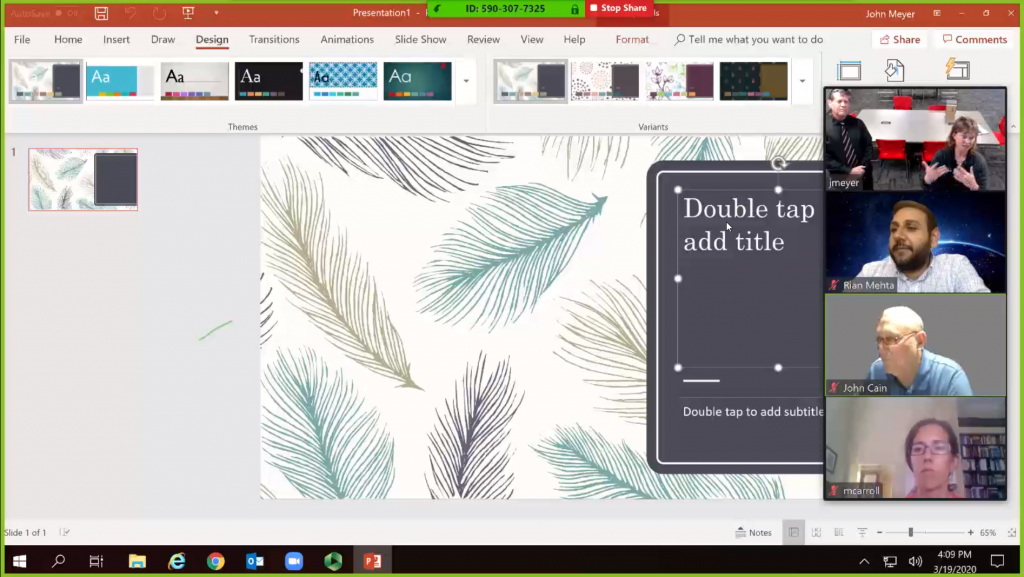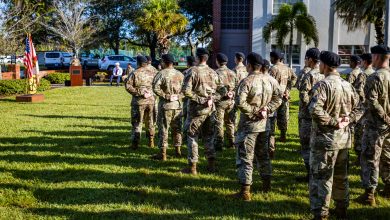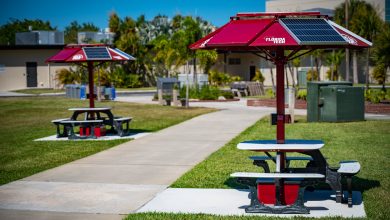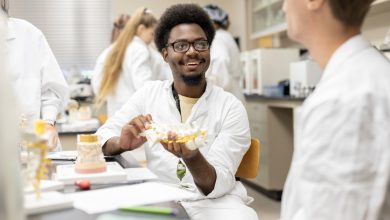Tech Transition: How Florida Tech Came Together to Get Classes Online
On the screen, the Infinity-class supercarrier and the much smaller Vulcan science vessel are headed directly at each other. “This will not end well,” the unseen narrator tells us.
And in fact as the two vehicles collide, a small, fiery explosion erupts.

Thusly damaged, the vehicles head to the side of the screen, which is now busy with a hand drafting equations denoting momentum, velocity and mass as our narrator asks how many “initial momenta” are needed to solve the problem he has just illustrated.
As you may have determined, this is not the latest sci-fi blockbuster, though it has already generated many positive reviews. It is one of more than 17 video lessons created, at last count, by David Harris, an assistant professor in the department of aerospace, physics and space sciences at Florida Tech, for teaching his Introductory Physics 1 course online.
Like his hundreds of faculty colleagues, Harris had to quickly adapt to teaching in the age of coronavirus. And like those colleagues, Harris brought to bear the creativity, intelligence and sense of humor that good teachers have in abundance. Oh, and special effects.
“When I included the special effects, I wasn’t thinking about any particular educational benefits. I just thought it would be fun,” Harris said. “However, once students started watching, I got dozens of emails complimenting me for my work. Now I think the special effects do have a real benefit: Students are more engaged with the material when they know the person making the videos is a person just like them, with quirks and hobbies. I hope my students can see that I’m having fun with this, and I hope they can have as much fun as I am.”
As with big-screen special effects, there is so much more going on behind the scenes of Florida Tech’s pandemic-fueled transition to online classes than meets the eye.
For starters, deans and their faculty members, working closely with the Office of the Provost, had to reimagine vast swaths of curricula and retool classes for online teaching.
“The faculty stepped up to the plate and delivered – a testament to their dedication to their profession, to their students and to this institution,” said Associate Provost Marc Baarmand. “The administration, along with the deans and the department heads, smoothed out some rough edges, but the heroes are the faculty.”
Among them is Moti Mizrahi, an associate professor of philosophy in the School of Arts and Communication. Understanding that two areas – flexibility and instructor availability – are key to successful online learning in this new environment, he tailored his classes to emphasize those needs.
“Asynchronous online learning is ideal because, instead of requiring students to be online at a set time, it gives students the flexibility they need, especially in these uncertain times, to review course materials and do their coursework at their own convenience,” he said.
Mizrahi structured his course content to guides students through each unit, creating a module for each one and dividing course content into week-length chunks. Within each module he makes course materials, including videos, slides, readings and more, available to students, who can log in to Canvas any time to review the content and complete their assignments on a weekly basis.
Even offering this bounty of necessary information, Mizrahi does not assume students will read everything he provides. So he posts announcements at least three times a week, sends reminders about assignments, participates in chats on discussion boards and gives students feedback on their work – all while encouraging his students to reach out via email, phone or Zoom.
“It helps students learn by letting them know that we are always there, just like in the classroom,” he said.
Mizrahi, Baarmand and many others were also eager to praise a particularly essential part of this transition: the IT department and its instructional technology team.
A university grounded in technology since its founding at the dawn of the space race has had to rely on technology in ways never experienced. Scores of IT and instructional technology staffers wrangled programs like Zoom, Canvas and Panopto into wider use than ever before and developed online training on the fly to ensure everyone knew how to maximize these critical tools.
Within a week or so, staffers including director of IT instructional technology John Meyer along with Jared Campbell, Jason Griggs, Amy Sullivan, Eric Donath, Thomas Couperthwaite, Nathaniel Ashton, Lee Storey and Zen Campbell, had convened in-person and webinar training courses on the various programs and tools, built several websites, created multiple videos, developed a list of faculty mentors who could also offer guidance, and participated in many, many meetings and brainstorming sessions.

“I don’t know if I’ve ever been so tired,” Meyer said of days that often started at 6 a.m. and went until 10 p.m. “It was not easy.”
But the effort was certainly appreciated. “Faculty have been very gracious,” Meyer said, noting all of the thank-you emails the team received.
“Our instructional technology team were key in their continuous efforts training our faculty in the tools needed to teach online. They really did a phenomenal job and were a key component to our success,” said vice president of informational technology Daniel Flores.
Flores pointed out it helped that Florida Tech was already well prepared to make the transition, with wide bandwidth, broad wireless access and strong cybersecurity protection.
The transition was truly a university-wide effort.
The final arbiter, of course, has been students. Patient with some initial hiccups, they have noticed and appreciated the university’s fairly nimble pivot to online instruction.
“In general, we have found students to be exceptionally supportive and engaged,” said College of Psychology and Liberal Arts Dean Lisa Steelman. “They have been a shining light for us and made a difficult situation much easier than expected.”
Sarah Cameron, a first-year student majoring in mechanical engineering, is enrolled in Harris’ class. She said she knew the switch to online classes would require more self-discipline on her part and that his approach made that easier.
“Dr. Harris has essentially given us an easy way to stay on track and make sure we’re keeping to a schedule. I use the daily quizzes and videos to see if I grasped the topic for the day, and I’m really enjoying it,” she said. “I wish more classes would upload videos like this and have daily quizzes like he does.”
Overall, Cameron said, “I think the transition to distance learning has been positive.”
It has not just been the students who are learning.
Harris said the experience has allowed him to better understand his teaching style as he thought more deeply about how students learn outside of the classroom, and within it.
“One thing I emphasize in class is the conceptual understanding of everything that is going on. That works well, but I always said I didn’t have enough time to also teach problem-solving ability,” he said. “Now I realize I can do both.”







